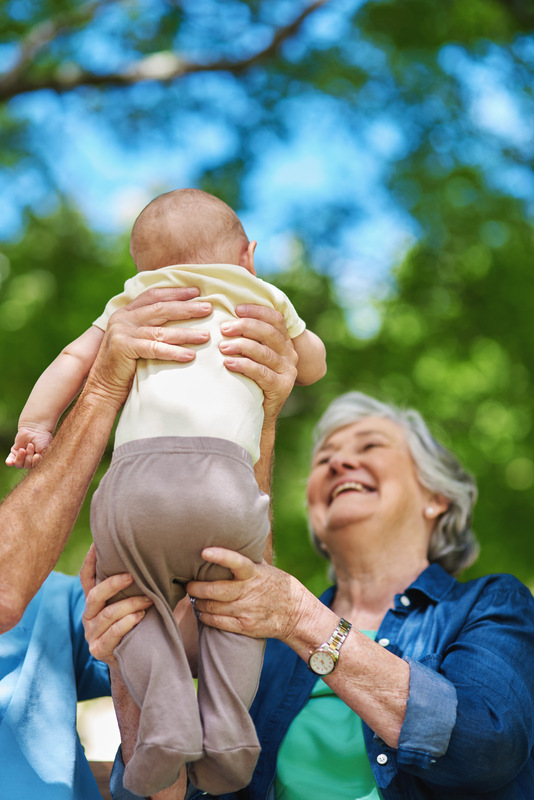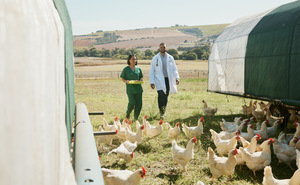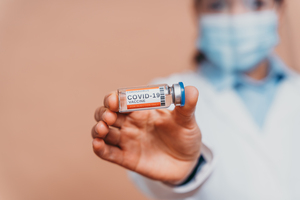Respiratory syncytial virus (RSV) is a common respiratory infection that typically causes mild, cold-like symptoms. But for infants, older adults, and those with weakened immune systems, RSV can lead to serious illness, including pneumonia and bronchiolitis. Each year, RSV sends thousands to the hospital—especially during fall and winter months. New vaccines and antibody treatments offer protection for those most at risk, helping to prevent severe disease and ease the strain on families and healthcare systems.
Find an RSV vaccine near me
Protect infants and older adults from severe RSV illness by getting vaccinated. Learn who should get immunized, how the vaccines work, and what to expect during RSV season.
RSV vaccines are recommended for older adults and pregnant people.
Infants may be protected by maternal vaccine or antibody.
Most receive one dose before RSV season for protection.

What is RSV?
Respiratory syncytial virus (RSV) is a common and highly contagious respiratory illness that usually causes cold-like symptoms. While most people recover in 1–2 weeks, RSV can be dangerous for infants, older adults, and people with chronic medical conditions or weakened immune systems.
RSV spreads through respiratory droplets, direct contact, or contaminated surfaces. It can lead to severe lower respiratory tract disease (LRTD), bronchiolitis, and pneumonia—particularly in babies under 6 months and adults over 60. Each year, RSV causes up to 160,000 hospitalizations and 10,000 deaths among older adults in the U.S.
RSV vs COVID vs the flu
RSV, COVID-19, and the flu can all cause similar symptoms like cough, fever, fatigue, and sore throat. However, RSV is more likely to cause wheezing and is a leading cause of bronchiolitis in infants. Older adults may also experience more severe symptoms from RSV. Diagnostic testing can help distinguish between them.
Who should get an RSV vaccine?
The CDC recommends RSV vaccination or antibody immunization for the following groups:
- Adults aged 75+
- Adults aged 60–74 with risk factors such as heart or lung disease, diabetes, or weakened immune systems
- Pregnant people in weeks 32–36 of pregnancy during RSV season (September–January)
- Infants whose mothers did not receive an RSV vaccine during pregnancy
- Young children (8–19 months) at high risk for severe RSV
Who should not get an RSV vaccine?
- Adults or children with a severe allergic reaction to any component of the RSV vaccine or antibody
- Babies already protected by maternal vaccination (should not receive antibody)
- People with moderate or severe illness should wait until they recover
How effective is the vaccine?
RSV vaccines and antibodies have shown strong protection against severe illness, especially in the highest-risk groups. In clinical trials, the vaccines reduced the risk of lower respiratory tract disease by up to 89% in older adults, while antibodies for infants cut RSV-related hospitalizations by more than 75%. While not 100% effective, these immunizations significantly reduce the chances of severe outcomes during RSV season.
RSV vaccine effectiveness for infants
- Maternal vaccine (Abrysvo): Reduces infant hospitalization risk by 57% in first 6 months
- RSV antibody (Nirsevimab): Reduces severe RSV illness by over 75%; provides protection for at least 5 months
RSV vaccine effectiveness for older adults
- Arexvy (GSK): 83% effective in preventing RSV-related illness in first season
- Abrysvo (Pfizer): 89% effective in first year; ~78% effective through mid-second season
- mRESVIA (Moderna): 83.7% effective early on; ~50% protection up to 18 months later
Where to get an RSV vaccine
Solv can help you book an RSV vaccine or antibody appointment near you—often on the same day and with transparent pricing or insurance coverage.
- Easy Scheduling: Search local clinics and pharmacies with real-time availability
- Infant Protection: Find providers offering maternal RSV vaccines or infant antibodies
- All-In-One Care: Book flu, COVID-19, and RSV vaccines together for seasonal protection

FAQs
What are the side effects of the RSV vaccine?
Most people experience mild side effects like pain at the injection site, fatigue, headache, or muscle aches. Serious reactions are rare but may include allergic responses or, in very rare cases, neurological events such as Guillain-Barré Syndrome (GBS). Talk to your provider if you have concerns.
Can I choose which RSV vaccine I receive?
Yes, in many cases you can choose among the available RSV vaccines (Arexvy, Abrysvo, or mRESVIA), but availability may vary by provider and location. All three vaccines are effective for eligible adults aged 60 and older.
Can RSV vaccines or antibodies be given with other vaccines?
Yes, RSV vaccines can be given at the same time as flu, COVID-19, and other adult vaccines. Some studies show slightly increased side effects with coadministration, so discuss timing with your healthcare provider.
Do RSV vaccines need a booster?
Currently, RSV vaccines are administered as a single dose. The CDC does not recommend an annual booster at this time, though future guidance may change based on ongoing research.
How much do RSV vaccines cost without insurance?
Many private insurance plans, Medicare, and Medicaid cover RSV vaccines at no cost. For those without insurance, the out-of-pocket cost can vary depending on the provider. Infants may qualify for free coverage through the Vaccines for Children (VFC) program.
Is the RSV antibody (nirsevimab) a vaccine?
No. Nirsevimab is a monoclonal antibody that provides immediate protection, rather than stimulating the immune system like a traditional vaccine. It’s given to infants who didn’t receive maternal RSV protection during pregnancy or are at higher risk.
Can older kids or healthy adults get the RSV vaccine?
The RSV vaccine is not currently recommended for healthy adults under 60 or for most older children and teens. These groups are typically at lower risk for severe RSV illness. Talk to a healthcare provider if you have a chronic condition or special concern.

How we reviewed this article
Medically reviewed
View this article’s sources and history, and read more about Solv’s Content Mission Statement, editorial process, and editorial team.
Sources
7 sources
Solv has strict sourcing guidelines and relies on peer-reviewed studies, academic research institutions, and medical associations. We avoid using tertiary references.
- RSV Vaccines | CDC (August 30, 2024) https://www.cdc.gov/rsv/vaccines/index.html
- Healthcare Providers: RSV Vaccination for Adults 60 Years of Age and Over | CDC (July 3, 2024) https://www.cdc.gov/vaccines/vpd/rsv/hcp/older-adults.html
- Should You Get an RSV Vaccine? (January 9, 2025) https://www.yalemedicine.org/news/should-you-get-an-rsv-vaccine
- RSV (Respiratory Syncytial Virus) Vaccine: What You Need to Know (October 17, 2024) https://www.immunize.org/wp-content/uploads/vis/pdf/rsv.pdf
- A New Vaccine Is Here to Protect You and Your Loved Ones From RSV This Winter (January 2, 2025) https://magazine.medlineplus.gov/article/a-new-vaccine-is-here-to-protect-you-and-your-loved-ones-from-rsv-this-winter
- Use of Respiratory Syncytial Virus Vaccines in Older Adults: Recommendations of the Advisory Committee on Immunization Practices, 2023 (July 21, 2023) https://www.cdc.gov/mmwr/volumes/72/wr/mm7229a4.htm?s_cid=mm7229a4_w
- How to Tell the Difference Between Flu, RSV, COVID-19, and the Common Cold (March 31, 2025) https://www.nfid.org/resource/how-to-tell-the-difference-between-flu-rsv-covid-19-and-the-common-cold/
7 sources
Solv has strict sourcing guidelines and relies on peer-reviewed studies, academic research institutions, and medical associations. We avoid using tertiary references.
- RSV Vaccines | CDC (August 30, 2024) https://www.cdc.gov/rsv/vaccines/index.html
- Healthcare Providers: RSV Vaccination for Adults 60 Years of Age and Over | CDC (July 3, 2024) https://www.cdc.gov/vaccines/vpd/rsv/hcp/older-adults.html
- Should You Get an RSV Vaccine? (January 9, 2025) https://www.yalemedicine.org/news/should-you-get-an-rsv-vaccine
- RSV (Respiratory Syncytial Virus) Vaccine: What You Need to Know (October 17, 2024) https://www.immunize.org/wp-content/uploads/vis/pdf/rsv.pdf
- A New Vaccine Is Here to Protect You and Your Loved Ones From RSV This Winter (January 2, 2025) https://magazine.medlineplus.gov/article/a-new-vaccine-is-here-to-protect-you-and-your-loved-ones-from-rsv-this-winter
- Use of Respiratory Syncytial Virus Vaccines in Older Adults: Recommendations of the Advisory Committee on Immunization Practices, 2023 (July 21, 2023) https://www.cdc.gov/mmwr/volumes/72/wr/mm7229a4.htm?s_cid=mm7229a4_w
- How to Tell the Difference Between Flu, RSV, COVID-19, and the Common Cold (March 31, 2025) https://www.nfid.org/resource/how-to-tell-the-difference-between-flu-rsv-covid-19-and-the-common-cold/
Book a vaccine provider
Own a clinic? Add your location.
Help patients book appointments with you on Solv. It's free!





